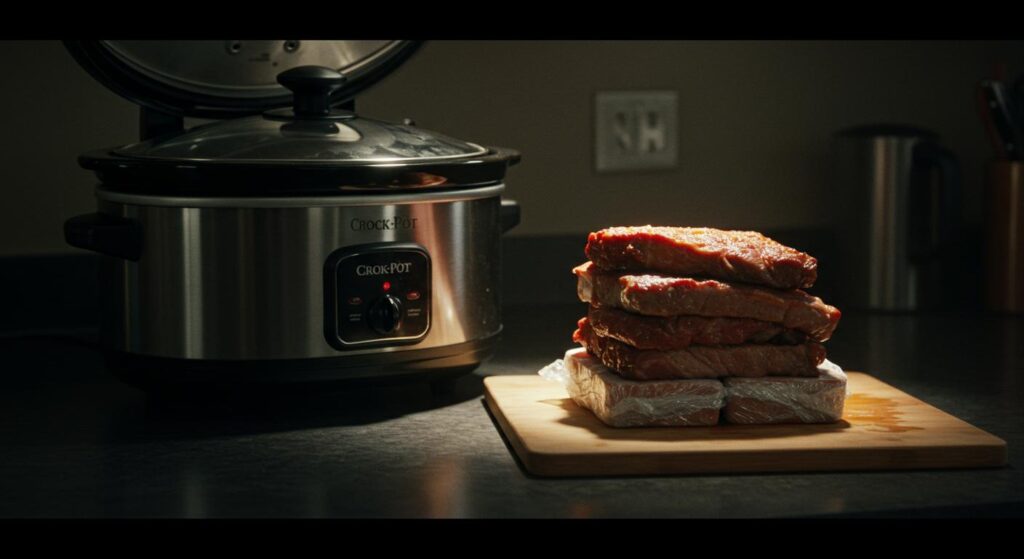Sometimes the headlines serve up such an unexpected concoction, you have to squint to make sure it isn’t a recipe for irony. According to Border Report, a recent border crossing at Nogales, Arizona, involved not a casserole or a prize-winning chili, but 7.18 kilos of fentanyl pills, stuffed into—you guessed it—a Crock-Pot filled with meat.
The Multi-Layered Crock-Pot Drama
As narrated in Border Report, the episode unfolded on June 18, with 27-year-old Jose Armando Longoria attempting to walk into Arizona from Sonora, Mexico, balancing a Crock-Pot brimming with meat. Border officers at the Dennis DeConcini Port of Entry looked on, perhaps pondering just how hungry one has to be to bring a slow cooker across an international boundary on foot. The officer manning the pedestrian lane requested Longoria to set down the Crock-Pot, at which point the surprising heaviness of the vessel prompted a transfer to secondary inspection.
There, officials recounted to Border Report, Longoria insisted the meat was ordinary, but a drug-sniffing dog soon expressed a professional difference of opinion. Once officers emptied and took apart the pot, they discovered 11 bags containing blue pills. Field testing confirmed what one might call the world’s least appetizing surprise: the haul was fentanyl, clocking in at over seven kilograms.
Court records cited by Border Report indicate that Longoria, after waiving his rights, stated he’d been offered $100 by an unknown party to smuggle the drugs in the Crock-Pot. While he admitted being solicited for similar favors before, he claimed this was his first actual attempt. The complaint, filed in U.S. District Court for the District of Arizona, describes a not-so-innovative compensation plan for what amounts to a high-risk kitchen adventure. A hundred dollars is, after all, barely enough to replace a high-end Crock-Pot if things go south.
Looking further into the outlet’s reporting, authorities have encountered a roster of unusual household-item smuggling attempts at this and other crossings: cheese-stuffed SUVs, cocaine-filled speaker boxes, even what Border Report describes elsewhere as Cheetos bags packed with meth. You get the sense that the classics—false-bottom suitcases, perhaps—have given way to Peter Pan logic: bring something so ordinary and beloved, and surely no one will question what’s inside.
Contraband in Comfort Food Disguise
The routine act of crossing a border with a kitchen staple is, under normal circumstances, the stuff of busy households or road-tripping relatives. Here, it was an oddity that stood out—perhaps because, as detailed in Border Report, even the most everyday object becomes theater when context is stripped away. You have to appreciate the professionalism of officers who not only noticed a potential anomaly in a mundane object, but also had the wherewithal to investigate further (and presumably resist making offhand stew jokes).
A detail highlighted by Border Report: Longoria’s claim that prior requests to smuggle drugs had always gone ignored. Was this a sudden leap of faith in the infallibility of grandma’s favorite appliance? Or just a testament to the thin rewards offered for maximum risk? It prompts questions about the underground economy that keeps finding new uses for the humble tools of domestic life. One wonders how many innocent Crock-Pots are now eyed with suspicion at border checkpoints, their fate bound to the schemes of side hustlers and desperate couriers.
Low and Slow, With a Dash of Irony
The outcome for Longoria is less whimsical. The outlet notes he faces federal felony charges for possession with intent to distribute over 400 grams of fentanyl, and is expected at a detention hearing in early July. As cases like these make their way through the legal and criminal justice system, they reinforce a simple adage: sometimes it’s not the elaborate gadgets or high drama, but the ordinary, slightly heavy Crock-Pot that tips the scale.
So here we have it: another chapter in the ongoing story of everyday objects pressed into stranger service. How many comfort food vessels will end up in evidence lockers, their slow-cooking past a distant memory? And what does it say about the now-blurry boundary between the familiar and the fantastical, when kitchenware becomes contraband’s courier?
If this is the trajectory of cross-border innovation, you have to wonder what’s sitting in the next aisle over, waiting for its turn on the customs declaration stage. A Bundt pan? An artisanal bread box? The world of “smuggling as performance art” appears to be going low and slow—with no recipe required, and most definitely, not your grandma’s.







